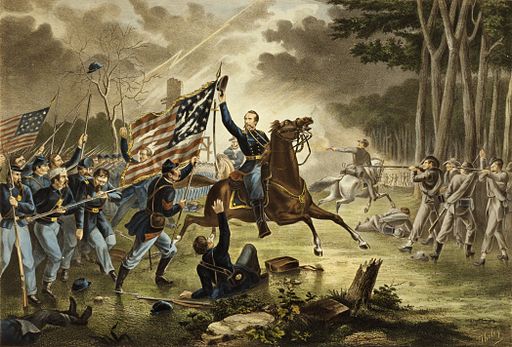 |
| Gen. Philip Kearny Photo: Matthew Brady / National Archives OPA |
"Quotes twice from Battle-Pieces and Aspects of the War" --Resources for American Literary Study 33Before Monteiro's citation, Kevin J. Hayes in the 2007 Cambridge Introduction to Herman Melville (88) noticed the invocation of Melville's poem "Chattanooga" in De Peyster's memorial tribute to Kearny, his cousin and the "American Bayard."
 | |
| General Kearny's gallant charge Augustus Tholey |
In reflecting upon PHIL KEARNY'S untimely fall, the lines of HERMAN MELVILLE'S "Battle Pieces" (Chattanooga, 92) must recur to the mind of whoever has read them:
"Near and more near; till now the flags
Run like a catching flame:
And one flares highest, to peril nighest —
He means to make a name;
Salvos! they give him his fame!
* * * * * *
"But some who gained the envied Alp,
And — eager, ardent, earnest there —
Dropped into Death's wide-open arms,
Quelled on the wing like eagles struck in air.
* * * * * *
"The smile upon them as they died;
Their end attained, that end a height:
Life was to those a dream fulfilled,
And death a starry night!"
As an echo to the spirit of these lines and their apposite appropriateness, drifts back from the far distant past the kindred idea embodied in the words addressed by EPAMINONDAS to his surrounding and lamenting soldiery. "This is not the end of life, my fellow-soldiers — it is now your General is born!" Born indeed—born to Immortality, whether as regards Existence or Fame! --Biography of Major-General Philip Kearny, pp 474-5De Peyster's second long quotation from Battle-Pieces is the entire poem On the Photograph of a Corps Commander minus the title. And here's something interesting. Look how De Peyster has altered the fifth line of the first stanza. In order to make the verse more directly applicable to Kearny, De Peyster replaces "Spottsylvania's charge" (Hancock's celebrated attack on the Mule Shoe) in Melville's poem with "Williamsburg's hot charge." Adding "hot" to "Williamsburg's" also allowed De Peyster to preserve the syllable count in the line:
De Peyster's omission of the poem's title and deletion of the reference to Spottsylvania show the significance of these elements as pointers to the identity of Corps Commander Winfield Scott Hancock. Yes Melville's verses are absolutely applicable to other military heroes, but the meditation on "manly" inspiration begins with the particular example of one who is precisely identifiable by his office (Corps Commander) and field of honor (Spotsylvania). That's why De Peyster drops both references, to Corps Commander and to Spotsylvania. Lacking the pointers to Hancock, Melville's verses more perfectly suit Kearny, widely lauded as a model of "manly" and "knightly conduct in war. The "eagle mien expressive" of Melville's original Corps Commander exactly matches the mien of Kearny, said to have "the face of an eagle."Ay, man is manly. Here you see
The warrior-carriage of the head,And brave dilation of the frame;
And lighting all, the soul that led
When balls began to whistle, his eagle countenance (figure d'oiseau de proie) and clear eye assumed a resolute expression which inspired confidence in those around him. --Comte de Paris, History of the civil war in AmericaDe Peyster's memorial "Character of Phil Kearny" including the lines from Melville's On the Photograph of a Corps Commander, with the change from "Spottsylvania's charge" to "Williamsburg['s] hot charge," opened the first number of The Volunteer: A Weekly Magazine (New York, 1869).
For more online about the American Bayard, also known as that "One-Armed Devil," check out the entry for Kearny at Ohio Civil War Central. Below, the 1869 biography of Philip Kearny by John Watts De Peyster, digitized version of the volume in the Library of Congress courtesy of HathiTrust Digital Library.

No comments:
Post a Comment